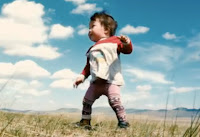 Babies. Those little bundles of joy. Those little creatures who can also terrorize your life. Do they really deserve their own film? "Babies" manages to prove that, beyond the cries and the screams, their is depth.
Babies. Those little bundles of joy. Those little creatures who can also terrorize your life. Do they really deserve their own film? "Babies" manages to prove that, beyond the cries and the screams, their is depth. Despite running well under 90 minutes, "Babies" is quite the epic of a documentary. It spans three continents, four countries, and multiple years. The point of the film is to document the beginning of a human life in every part of the world. One baby comes from a small village in Namibia. Another comes from the Mongolian steppes. In contrast, the final two come from the bustling urban metropolises of Tokyo and San Francisco.
French director Thomas Balmes guides the audience through the critical stages of an early life. Much time is spent on birth, first words, and of course, the first steps. Despite devoting much time on these important moments, Balmes does a very French thing and brings us through many small moments that have no true impact on a life, yet are so poignant for that reason alone. One of the most memorable of these moments include the Mongolian baby waking up to find a rooster in his bed. It's never mentioned again, and it does nothing to show the baby growing up, yet its just so unique in how much detail is paid to that one little snippet we never see again.
There is one thing "Babies" truly has going for it: how expertly edited it is. Balmes likely had hundreds of hours of remarkable footage to use, and certainly a wonder how he was able to narrow it down to just 79 minutes. It must've been a painstaking process, yet he certainly took all of the effort to choose exactly all of the right shots.
The editors also knew quite well how certain shots and scenes should align with one another. Many are placed next to each other to either show differences or similarities. We see that in every culture, sibling rivalries exist. We also see that in every culture, each mother has her own way of teaching her child about the world. This supports the film's main idea: everyone is brought into the world blank, and comes out differently from what they see, and what they experience. It's a simple idea that's supported with the help of a lot of complex imagery.
Yes, that imagery. It's striking. While it's always interesting to see what the babies are doing, Balmes likes to explore the territory they're in. He finds us a river in the middle of the Namibian desert, and a lush park amongst the urban sprawl of Tokyo. These shots, the ones we never see, are the kind of shots a good documentary filmmaker should capture, and never let go of.
If there's one complaint most people seem to have about "Babies," it's that it's virtually devoid of any speaking. There is some background speaking, but mainly there's the mumbling and grumbling of the babies. This factor serves to be both a positive and negative aspect of the film. I don't think it would've been much trouble for Balmes to add in subtitles or just a short voiceover to at least explain a few things. Because these things are missing, the film, at times can just feel like a compilation of home movies.
However, when examining the film from a more critical perspective, perhaps this was done in order to make the world as fresh, new, and confusing as a baby would see it. Perhaps that lack of dialogue is to fully emphasize the action occurring on screen, and allowing character to build through these actions. Maybe Balmes wanted the moments where the babies first walk to feel like skeleton thrashing scene in "2001: A Space Odyssey" or the scene when Daniel drags himself out of well, leg broken, in "There Will Be Blood." At a point like that, who cares what some dialogue could say about it? The images speak for themselves.
"Babies" does exactly what it sets out to do: show the things that make us different and make us the same through the use of babies. If you were looking for the interior monologue of a baby, then maybe you should watch "Baby Geniuses" instead. "Babies" is an exploration of the beginnings of a human mind. It's like "March of the Penguins" for babies.

No comments:
Post a Comment